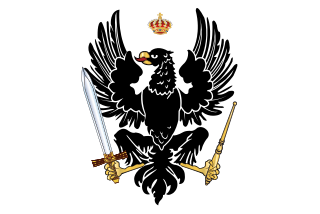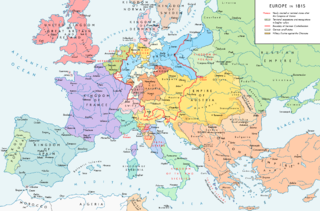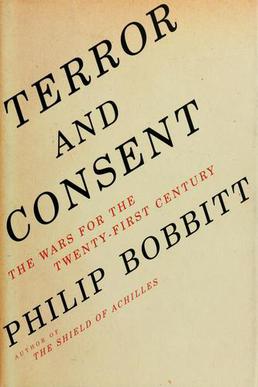
The German Empire, also referred to as Imperial Germany, the Second Reich or simply Germany, was the period of the German Reich from the unification of Germany in 1871 until the November Revolution in 1918, when the German Reich changed its form of government from a monarchy to a republic.
Politics is the set of activities that are associated with making decisions in groups, or other forms of power relations among individuals, such as the distribution of resources or status. The branch of social science that studies politics and government is referred to as political science.

The Peace of Westphalia is the collective name for two peace treaties signed in October 1648 in the Westphalian cities of Osnabrück and Münster. They ended the Thirty Years' War (1618–1648) and brought peace to the Holy Roman Empire, closing a calamitous period of European history that killed approximately eight million people. Holy Roman Emperor Ferdinand III, the kingdoms of France and Sweden, and their respective allies among the princes of the Holy Roman Empire, participated in the treaties.

World peace is the concept of an ideal state of peace within and among all people and nations on Planet Earth. Different cultures, religions, philosophies, and organizations have varying concepts on how such a state would come about.
World government is the concept of a single political authority with jurisdiction over all of Earth and humanity. It is conceived in a variety of forms, from tyrannical to democratic, which reflects its wide array of proponents and detractors.

Early modern Europe, also referred to as the post-medieval period, is the period of European history between the end of the Middle Ages and the beginning of the Industrial Revolution, roughly the mid 15th century to the late 18th century. Historians variously mark the beginning of the early modern period with the invention of moveable type printing in the 1450s, the Fall of Constantinople and end of the Hundred Years' War in 1453, the end of the Wars of the Roses in 1485, the beginning of the High Renaissance in Italy in the 1490s, the end of the Reconquista and subsequent voyages of Christopher Columbus to the Americas in 1492, or the start of the Protestant Reformation in 1517. The precise dates of its end point also vary and are usually linked with either the start of the French Revolution in 1789 or with the more vaguely defined beginning of the Industrial Revolution in late 18th century England.

The Kingdom of Prussia constituted the German state of Prussia between 1701 and 1918. It was the driving force behind the unification of Germany in 1866 and was the leading state of the German Empire until its dissolution in 1918. Although it took its name from the region called Prussia, it was based in the Margraviate of Brandenburg. Its capital was Berlin.

The Concert of Europe was a general agreement among the great powers of 19th-century Europe to maintain the European balance of power, political boundaries, and spheres of influence. Never a perfect unity and subject to disputes and jockeying for position and influence, the Concert was an extended period of relative peace and stability in Europe following the Wars of the French Revolution and the Napoleonic Wars which had consumed the continent since the 1790s. There is considerable scholarly dispute over the exact nature and duration of the Concert. Some scholars argue that it fell apart nearly as soon as it began in the 1820s when the great powers disagreed over the handling of liberal revolts in Italy, while others argue that it lasted until the outbreak of World War I and others for points in between. For those arguing for a longer duration, there is generally agreement that the period after the Revolutions of 1848 and the Crimean War (1853–1856) represented a different phase with different dynamics than the earlier period.

The First Brazilian Republic, also referred to as the Old Republic, officially the Republic of the United States of Brazil, refers to the period of Brazilian history from 1889 to 1930. The Old Republic began with the deposition of Emperor Pedro II in 1889, and ended with the Brazilian Revolution of 1930 that installed Getúlio Vargas as a new president. During the First Brazilian Republic, Brazil was dominated by a form of machine politics known as coronelism, in which the political and economic spheres were dominated by large landholders. The most powerful of such landholders were the coffee industry of São Paulo and the dairy industry of Minas Gerais. Because of the power of these two industries, the Old Republic's political system has been described as "milk coffee politics."

A great power is a sovereign state that is recognized as having the ability and expertise to exert its influence on a global scale. Great powers characteristically possess military and economic strength, as well as diplomatic and soft power influence, which may cause middle or small powers to consider the great powers' opinions before taking actions of their own. International relations theorists have posited that great power status can be characterized into power capabilities, spatial aspects, and status dimensions.
Power politics is a theory of power in international relations which contends that distributions of power and national interests, or changes to those distributions, are fundamental causes of war and of system stability.

Paul Michael Kennedy is a British historian specialising in the history of international relations, economic power and grand strategy. He is on the editorial board of numerous scholarly journals and writes for The New York Times, The Atlantic, and many foreign-language newspapers and magazines. His monthly column on current global issues is distributed worldwide by the Tribune Content Agency.

Philip Chase Bobbitt is an American legal scholar and political theorist. He is best known for work on U.S. constitutional law and theory, and on the relationship between law, strategy and history in creating and sustaining the State. He is currently the Herbert Wechsler Professor of Jurisprudence at Columbia Law School and a distinguished senior lecturer at The University of Texas School of Law.
Global politics, also known as world politics, names both the discipline that studies the political and economic patterns of the world and the field that is being studied. At the centre of that field are the different processes of political globalization in relation to questions of social power.
The Westphalian system, also known as Westphalian sovereignty, is a principle in international law that each state has exclusive sovereignty over its territory. The principle developed in Europe after the Peace of Westphalia in 1648, based on the state theory of Jean Bodin and the natural law teachings of Hugo Grotius. It underlies the modern international system of sovereign states and is enshrined in the United Nations Charter, which states that "nothing ... shall authorize the United Nations to intervene in matters which are essentially within the domestic jurisdiction of any state."
Cabinet wars, derived from the German expression Kabinettskriege, is a historical term to describe the shift from the regular, limited, aristocratic conflicts of the eighteenth century to total war following the French Revolution. Historians define cabinet wars as a period of small conflicts not involving standing armies, but with a growing military class arising to advise monarchs. The term derived from the council these cabinets provided during the period of absolute monarchies from the 1648 Peace of Westphalia to the 1789 French Revolution. These cabinets were marked by diplomacy and a self-serving nobility.
In many periodizations of human history, the late modern period followed the early modern period. It began around 1800 and, depending on the author, either ended with the beginning of contemporary history in 1945, or includes the contemporary history period to the present day.
A commoner, also known as the common man, commoners, the common people or the masses, was in earlier use an ordinary person in a community or nation who did not have any significant social status, especially a member of neither royalty, nobility, nor any part of the aristocracy. Depending on culture and period, other elevated persons may have had higher social status in their own right, or were regarded as commoners if lacking an aristocratic background.
The capitalist peace, or capitalist peace theory, or commercial peace, posits that market openness contributes to more peaceful behavior among states, and that developed market-oriented economies are less likely to engage in conflict with one another. Along with the democratic peace theory and institutionalist arguments for peace, the commercial peace forms part of the Kantian tripod for peace. Prominent mechanisms for the commercial peace revolve around how capitalism, trade interdependence, and capital interdependence raise the costs of warfare, incentivize groups to lobby against war, make it harder for leaders to go to war, and reduce the economic benefits of conquest.

Terror and Consent: The Wars for the Twenty-First Century is a work by Philip Bobbitt that calls for a reconceptualization of what he calls "the Wars on Terror." First published in 2008 by Alfred A. Knopf in the U.S. and by the Allen Lane imprint of Penguin in the U.K., Terror and Consent takes as its foundation Bobbitt's grand historical theory of the co-evolution of the state and warfare which he developed in The Shield of Achilles: War, Peace, and the Course of History. The book consists of an introduction, three parts, and a conclusion.











